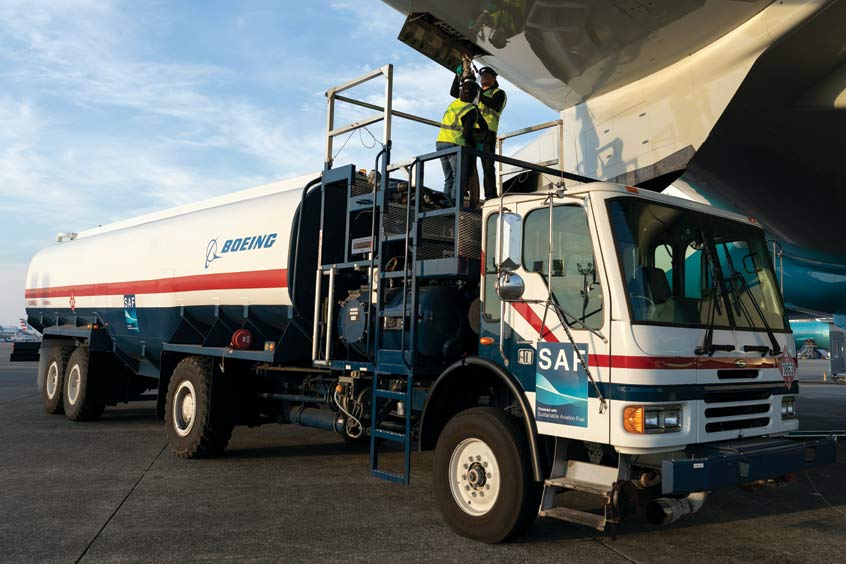ACE 2026 - The home of global charter.
• Boeing Business Jets
Aircraft
• Neste
BAN's World Gazetteer
• Michigan The bimonthly news publication for aviation professionals.
The bimonthly news publication for aviation professionals.

Boeing has signed agreements to purchase 5.6 million gallons (21.2 million litres) of blended sustainable aviation fuel (SAF) produced by Neste to support its US commercial operations through 2023. These agreements more than double the company's SAF procurement from last year.
"We are demonstrating our commitment to reduce our carbon footprint and catalyse the SAF industry," says vice president of environmental sustainability Sheila Remes. "This SAF procurement makes up 25 per cent of Boeing's total jet fuel needs for last year including our production, delivery, Boeing ecoDemonstrator and Dreamlifter flights, and we aim to increase that portion in the years to come."
The purchase agreements include supply of Neste MY Sustainable Aviation Fuel, which is blended with conventional jet fuel at a 30/70 ratio to produce the blended SAF. Neste MY SAF is made from 100 per cent renewable waste and residue raw materials such as cooking oil and animal fat waste, and meets strict sustainability criteria.
“As one of the top aircraft manufacturers in the world, Boeing is sending a clear message to the entire aviation industry through this purchase that SAF is a key solution to reduce greenhouse gas emissions from flying,” adds Neste vice president Americas, renewable aviation Michael Sargeant. “We are proud to be a part of this collaboration along with our partners EPIC Fuels, Signature Aviation and Avfuel.”
EPIC Fuels and Signature Aviation company will provide 2.3 million gallons and Avfuel will supply 300,000 gallons of this blended SAF for the Boeing ecoDemonstrator flight test programme and the company's commercial sites in Washington state and South Carolina. Boeing is also purchasing an additional three million gallons of the same blended SAF from EPIC Fuels and Signature Aviation, generating emissions reduction credits for its commercial deliveries, Dreamlifter and executive flights. These benefits are generated by a book-and-claim process that displaces petroleum jet fuel with SAF in fuelling systems outside the company's fuel supply.
In 2021, Boeing committed to deliver its commercial aircraft capable and certified to fly on 100 per cent SAF by 2030. SAF reduces CO2 emissions by as much as 80 per cent over the fuel's life cycle with the potential to reach 100 per cent in the future, and is widely recognised as offering the greatest potential to decarbonise aviation over the next 20 to 30 years. Made from several feedstocks, SAF is certified for commercial use and can currently be blended up to 50 per cent with traditional jet fuel without modifications to aircraft, engines or fuelling infrastructure.
Among Boeing's key SAF-enabling milestones are:
- In a February 2023 pivotal testing milestone, the development of jet reference fluids enabled SAF compatibility testing to help fulfil the company's commitment to producing 100 per cent SAF-capable aircraft.
- In 2019, customers were given the option to power commercial delivery flights with SAF, demonstrating its commitment to reducing CO2 and to further spur the use of cleaner fuels.
- In 2018, the Boeing ecoDemonstrator made the industry's first commercial aircraft test flight with 100 per cent SAF in both engines of a 777 Freighter in partnership with FedEx.
- Boeing made initial SAF test flights in 2008, enabled approval for commercial SAF use in 2011 and aircraft delivery flights in 2012.